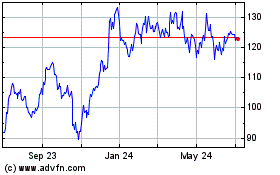By Ryan Dezember
Fannie Mae has agreed to backstop up to $1 billion in debt from
the country's largest owner of single-family rental homes, the
first time the government-sponsored entity has agreed to guarantee
the debt of an institutional owner of single-family houses.
Blackstone Group LP's Invitation Homes Inc. disclosed its
agreement with Fannie on Monday in a filing detailing the company's
finances ahead of its planned initial public offering. After the
foreclosure crisis, the New York investment firm spent roughly $10
billion buying and fixing up houses to rent through Invitation
Homes.
Fannie Mae's involvement is a sign that it believes
homeownership will remain out of reach for many Americans and that
Wall Street's housing wager will be become a long-term business,
not just an opportunistic trade made after the foreclosure
crisis.
The support represents a shift from about four years ago, when
Fannie's regulator blocked another government-sponsored entity from
backing bulk buyers of foreclosed homes. Fannie's support will
likely make it cheaper for buyers like Blackstone to add homes in
the future.
Invitation said it secured commitments from Wells Fargo &
Co. and Fannie on a 10-year loan secured by some of its 48,431
homes. Invitation, which is based in Dallas and owns properties in
13 metropolitan markets, said it would use the loan proceeds to
repay older debt.
That debt was raised by selling bonds backed by rental revenue
for bundles of specific homes. Invitation was the first to sell
such bonds in 2013 and has been a major issuer since. In all, big
investors have sold about $18.3 billion of rental-backed bonds,
with about $16.8 billion of such debt outstanding, according to
Kroll Bond Rating Agency Inc.
A Blackstone spokeswoman declined to comment. Invitation
representatives didn't respond to requests for comment.
"Today, single-family homes account for more than 50% of the
rental market, offering individuals and families access to good
neighborhoods, schools, and employment centers," Fannie Mae told
The Wall Street Journal. "This transaction helps us gather data and
test the market to ensure we are delivering the right solutions
that meet the increasing demand for single-family rental housing
across all demographics."
U.S. homeownership has declined since the housing crisis amid
strict lending standards, mounting student debt and would-be buyers
whose savings and credit were diminished by the recession. Last
year, the homeownership rate reached its lowest levels in at least
50 years, according to U.S. Census data.
Competition from individual buyers is a risk to big home-rental
businesses, especially now that foreclosure rates have returned to
normal levels and many of their new purchases are made on the open
market.
Fannie and its smaller sibling Freddie Mac don't issue
mortgages. Rather, they buy mortgages issued by banks, bundle them
and sell the debt, which they guarantee against default, to
investors. Since 2008, they have been controlled by the U.S.
government, which took control of the companies through a process
known as conservatorship when the foreclosure crisis prompted
concerns that they might fail and intensify the financial
panic.
In 2012, the entities' regulator, the Federal Housing Finance
Agency, blocked Freddie from financing investors who were buying up
foreclosed homes in bulk amid concerns that Freddie's cheap debt
would make it difficult for banks to compete on loans to the
growing number of investors gobbling up foreclosed homes.
Much has changed since then. Beside the advent of the
rental-backed bond market, two Invitation rivals -- American Homes
4 Rent and Colony Starwood Homes, the country's second- and
third-largest single-family homeowners, respectively -- have gone
public. Also, home prices have rebounded.
Fannie has long backstopped loans to the mom-and-pop landlords
that have traditionally dominated the rental-home business. Fannie
and Freddie also insure debt sold by institutional owners of
multifamily housing, such as apartments.
Fannie's move should put big landlords like Blackstone on equal
footing with such investors, said Dave Bragg, managing director of
real estate research firm Green Street Advisors LLC.
On a call Monday morning with investors and Green Street
analysts, Donald Mullen Jr., a former Goldman Sachs Group Inc.
executive whose Pretium Partners LLC backs Progress Residential,
owner of the fourth-largest pool of U.S. rental homes, said
Fannie's agreement with Invitation is "overdue" and should put to
rest skepticism over the staying power of the institutional
rental-home business.
Lately, Mr. Mullen has been soliciting investors for another $1
billion to buy more houses to add to the 20,000 Progress already
owns, The Wall Street Journal has reported.
"This is a great outcome not just because it obviously will
reduce the cost of our financing but it puts a further stamp of
approval on this industry," Mr. Mullen, who a decade ago oversaw
Goldman's lucrative bet against the housing market, known as "the
big short," said Monday.
Write to Ryan Dezember at ryan.dezember@wsj.com
(END) Dow Jones Newswires
January 24, 2017 09:18 ET (14:18 GMT)
Copyright (c) 2017 Dow Jones & Company, Inc.
Blackstone (NYSE:BX)
Historical Stock Chart
From Mar 2024 to Apr 2024

Blackstone (NYSE:BX)
Historical Stock Chart
From Apr 2023 to Apr 2024
